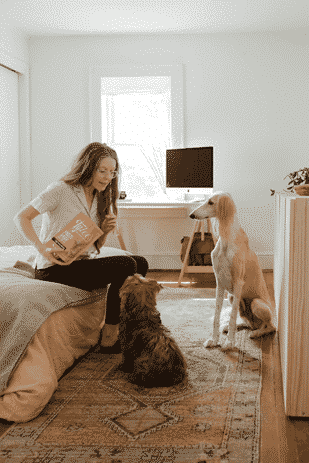

6 Factors to Consider When Selecting a Dog Breed
Selecting the right dog breed comprises of many factors, and it’s a decision that must not be taken lightly. If you wish to give an adorable pooch a loving home, here are a few essential factors that you need to consider.
The thought of bringing home an adorable little puppy is surely exciting not just for you but also for your family. A pet is, after all, a new family member and deserves the best kind of welcome from its owners.
There so many cute and beautiful dog breeds out there that simply melt your heart, and you might be tempted to bring all them of home, but it’s so much more than just their cuteness.
Selecting the right dog breed comprises of many factors, and it’s a decision that must not be taken lightly.
For instance, you might be thinking of bringing a fluffy little Pomeranian home, but are you aware that Poms require a great deal of attention, care and patience?
It’s important that you find just the right dog for you. Whether you adopt one from an animal shelter or a breeder, you must ensure that the particular breed is most compatible with your life and the kind of lifestyle you have.
Selecting the right dog breed can make all the difference to your new pet’s happiness as well as to yours!
If you wish to give an adorable pooch a loving home, here are a few essential factors that you need to consider.
1. Six Factors to Consider When Selecting a Dog Breed
1.1 The Size
First things first, you need to take into account the size of your living space in order to determine if it is comfortable and spacious enough for the new family member.
After all, the size of a dog directly relates to how much space they will require.
For instance, German Shepherds and Great Danes are two of the many large dog breeds that require extensive space both indoors and outdoors. On the other hand, Toy Poodles and Chihuahuas can do well in small apartments and condos.
So, your choice of dog breed greatly depends on how much space you have available to offer to them.
1.2 The Age
We all know that a dog’s personality changes over the course of each age that includes puppyhood, adolescence, adulthood, and seniors. If you are a first-time dog owner, you are likely to feel torn when it comes to choosing between a puppy and an adult dog.
Each age brings many changes in the dogs, and there are both pros and cons in each stage. For example, if you go with an adult dog, it’s likely to be housetrained with a calmer temperament, but at the same time, it might not be able to adjust in your home if there are little children in it.
On the other hand, if you opt for a puppy, you must prepare yourself to invest a lot of time and effort in training them. A puppy may not be the ideal option if you generally lead a very busy lifestyle.
So, you must give due consideration to the age factor when selecting the right dog breed.
1.3 Children and Family Members
Before you bring a new pet home, you need to make sure that your family members are all on board with the idea. More than that, if you have children in the house, you must consider their needs too.
There are so many different dog breeds, but not all work well with children. Each breed has a different demeanor, and the last thing you want to do is introduce your child to an aggressive dog.
There are some breeds that have been shown to work amazingly well with children, such as Golden Retrievers, Labradors and Boxers, to name a few. So, do your research, consider the needs of your family and then make a decision.
1.4 Cost and Expenses
Regardless of a dog’s size, temperament, habits or breed, they all require some basic supplies that include toys, bedding, food, water bowls, treats, crates for traveling, grooming supplies, health care, collar and leash.
There are many other potential costs as well, such as vaccinations, professional grooming, extensive medical care, etc.
So, as a pet owner, you need to consider your financial commitment along with the animal’s needs before choosing a specific breed.
1.5 Temperament
Some dogs are highly energetic, others not so much. Some breeds are known to have aggressive tendencies, while others are more towards the softer side.
So, when selecting the right dog breed, you must take into consideration the temperament of the dog in terms of the following characteristics: sensitivity, aggression levels, protectiveness, intelligence, compatibility with other people and animals, playfulness, activity levels and the overall energy.
After all, you want your new pet to fully adapt to your lifestyle, get along with your family members and live in maximum peace and comfort.
1.6 Trainability or Ease of Training
When you bring home a cute little pup, you obviously want to play with it, take it on walks, and teach it some tricks and commands.
Therefore, when choosing a breed, you want to consider their trainability and how easy or hard it is to train them.
Some dog breeds such as poodles and Labrador retrievers are known to be highly trainable given how obedient and intelligent they are. On the other hand, Rottweilers and Beagles are comparatively harder to train.
So, keep in mind a dog’s trainability levels before bringing one home.
2. Happy Cuddling With Your New Pet!
No matter what dog breed you bring home, there’s certainly no doubt about the fact that there’s no greater joy than cuddling with your pet and ruffling its silky, fluffy coat.
Just make sure to consider the above factors to ensure that you are selecting the right dog breed for yourself as well as your family.
After all, you want to have fun with your pet, give it a comfortable living environment, train it to be a loving, caring and obedient companion, and of course, establish that pet-parent bond with it.
Discover how to create a joyful, healthy home for your pet.
Subscribe to your weekly rundown of practice, real life ideas and training tips straight to your inbox.


